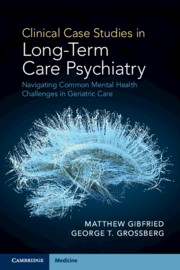 Clinical Case Studies in Long-Term Care Psychiatry
Clinical Case Studies in Long-Term Care Psychiatry End-of-Life Care in MNCD
Published online by Cambridge University Press: 31 October 2024
Primary health care providers and mental health professionals are likely to be engaged with family or care staff with questions regarding end-of-life care issues in those in the terminal stages of major neurocognitive disorders. Those who provide care in the long-term care setting should be familiar with issues regarding end-of-life care in MNCD. Palliative care is an approach to medical care that focuses on providing relief from pain, other symptoms, and the physical, emotional, and psychosocial stress that individuals with serious illnesses may experience. The primary goal of palliative care is to improve the quality of life for patients and their families, particularly when dealing with complex, chronic, or terminal medical conditions. Hospice care is appropriate for patients that are entering the terminal stage of illness and is provided through a licensed hospice agency. The hospice care model focuses on improving comfort and quality of life. It is a holistic approach that encompasses physical, emotional, social, and spiritual support and can be provided in almost any care setting.
To save this book to your Kindle, first ensure [email protected] is added to your Approved Personal Document E-mail List under your Personal Document Settings on the Manage Your Content and Devices page of your Amazon account. Then enter the ‘name’ part of your Kindle email address below. Find out more about saving to your Kindle.
Note you can select to save to either the @free.kindle.com or @kindle.com variations. ‘@free.kindle.com’ emails are free but can only be saved to your device when it is connected to wi-fi. ‘@kindle.com’ emails can be delivered even when you are not connected to wi-fi, but note that service fees apply.
Find out more about the Kindle Personal Document Service.
To save content items to your account, please confirm that you agree to abide by our usage policies. If this is the first time you use this feature, you will be asked to authorise Cambridge Core to connect with your account. Find out more about saving content to Dropbox.
To save content items to your account, please confirm that you agree to abide by our usage policies. If this is the first time you use this feature, you will be asked to authorise Cambridge Core to connect with your account. Find out more about saving content to Google Drive.